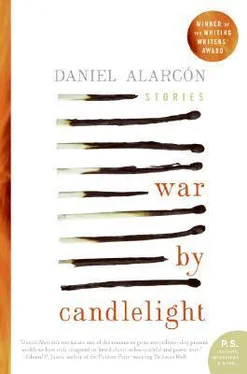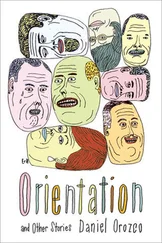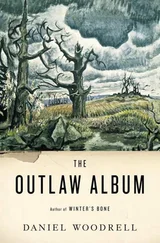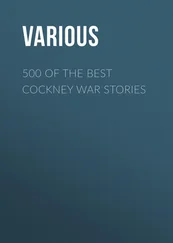Wari felt his face turn red. “Is lucky,” he said.
She laughed.
“Where is? Eric?” he asked, cringing at his pronunciation.
“Studying. Work. He teaches undergrads. Young students ,” she said, translating young, in gestures, as small.
Wari pictured Eric, with his wide, pale face and red hair, teaching miniature people, tiny humans who looked up to him for knowledge. He liked that Leah had tried. He understood much more than he could say, but how could she know that?
He watched her for a while, filing metal and twisting bands of silver into circles. He liked the precision of her work, and she didn’t seem to mind him. Leah burnished a piece, filed and sanded, bent metal with tools that seemed too brusque for her delicate hands. She held a hammer with authority, she was a woman with purpose. It was a powerful display. “I’m finishing up,” she said finally, “and then you can come with me. I know a Peruvian you can talk to.”
He showered and ate a bowl of cold cereal before they left for downtown. The Peruvian she knew was named Fredy. She didn’t know where he was from exactly, though she was sure he’d told her. Fredy worked a street fair on Canal. Leah had won him over with a smile a few years before, and now he let her sell her jewelry on consignment. Every couple of weeks, she went down with new stuff, listened as Fredy catalogued what had sold and what hadn’t, and to his opinionated take on why. He lived in New Jersey now, Leah said, and had married a Chinese woman. “They speak to each other in broken English. Isn’t that amazing?”
Wari agreed.
“It must say something about the nature of love, don’t you think?” Leah asked. “They have to trust each other so completely. That window of each other that they know in English is so small compared to everything they are in their own language.”
Wari wondered. The train rattled on its way downtown. But it’s always like that, he wanted to say, you can never know anyone completely. Instead he was silent.
“Do you understand me when I speak?” Leah asked. “If I speak slowly?”
“Of course,” Wari said, and he did, but felt helpless to say much more. He noted the descending numbered streets at every stop, and followed their subterranean progress on the map. A sticker covered the southern end of the island. They got off before they reached that veiled area. On Canal, only a few blocks was enough to remind Wari of Lima: that density, that noise, that circus. The air was swollen with foreign tongues. He felt comfortable in a way, but didn’t mind at all when Leah took his arm and led him swiftly through the crowds of people. He bumped shoulders with the city, like walking against a driving rain.
Fredy turned out to be Ecuadorian, and Leah couldn’t hide her embarrassment. She turned a rose color that reminded Wari of the dying light at dusk. Wari and Fredy both reassured her it was nothing.
“We’re brother countries,” Fredy said.
“We share border and history,” said Wari.
The Ecuadorian was all obsequious smiles, spoke of the peace treaty that was signed only a few years before. Wari played along, shook Fredy’s hand vigorously until Leah seemed at ease with her mistake. Then she and Fredy talked business, haggling in a teasing way that seemed more like flirting, and of course Leah won. When this was finished, she excused herself, and drifted away to the other stands, leaving Wari and Fredy alone.
When she was out of earshot, Fredy turned to Wari. “Don’t ask me for work, compadre ,” he said, frowning. “It’s hard enough for me.”
Wari was taken aback. “Who asked you for work? I’ve got work, cholo .”
“Sure you do.”
Wari ignored him, inspected the table laid out with small olive forks bent into ridiculous earrings. At the other end, there were black-and-white photos of Andean peaks, silvery and snowcapped, and others of ruined fortresses of stone and colonial churches. The scenes were devoid of people: landscapes or buildings or scattered rocks carved by Incas, unified by their uninhabited emptiness. “There’s no people,” Wari said.
“They emigrated,” sneered Fredy.
“This shit sells?”
“Good enough.”
“That’s my girl, you know,” Wari said all of a sudden, and he liked the tone of the lie, the snap of it, and the way the Ecuadorian looked up, surprised.
“The gringa?”
“Yeah.”
“I bet she is,” said Fredy.
Then two customers appeared, a young woman with her boyfriend. Fredy switched to English, heavily accented but quite acceptable, and pointed to various objects, suggesting earrings that matched the woman’s skin tone. She tried on a pair, Fredy dutifully held the mirror up for her, her distracted boyfriend checking out the photos. Wari wondered where Leah had gone off to. The woman turned to him. “What do you think?” she asked, looking back and forth between Wari and Fredy.
“Is very nice,” Wari said.
“Like a million bucks,” said Fredy.
“Where’s this from?” she asked, fingering the lapis lazuli stone.
“Peru,” said Wari.
Fredy shot him a frown. “From the Andes,” he said.
“Trev,” she called to her boyfriend. “It’s from Peru! Isn’t it nice?”
She pulled out a twenty and Fredy made change. He wrapped the earrings in tissue paper and handed her a card. The couple walked away, chatting. Wari and Fredy didn’t speak.
Leah reappeared and Wari made sure to touch her, thoughtlessly, as if it meant nothing at all. He could feel Fredy watching them, studying each of their movements. “Did you tell Fredy about your opening?” she asked Wari.
He shook his head. “So modest,” Leah said and filled in the details and, to his delight, exaggerated its importance and weight. Wari felt like a visiting dignitary, someone famous.
Wari put his arm around Leah. She didn’t stop him. Fredy said it would be difficult to make it.
“Okay, but maybe?” she asked.
“Please come,” added Wari, not worrying about his pronunciation.
Leaving is no problem. It’s exciting actually; in fact, it’s drug. It’s the staying gone that will kill you. This is the handed-down wisdom of the immigrant. You hear it from the people who wander home, after a decade away. You hear about the euphoria that passes quickly; the new things that lose their newness and, soon after, their capacity to amuse you. Language is bewildering. You tire of exploring. Then the list of things you miss multiplies beyond all reason, nostalgia clouding everything: in memory, your country is clean and uncorrupt, the streets are safe, the people universally warm, and the food consistently delicious. The sacred details of your former life appear and reappear in strange iterations, in a hundred waking dreams. Your pockets fill with money, but your heart feels sick and empty.
Wari was prepared for all this.
In Lima, he rounded up a few friends and said his good-byes. Tentative, equivocal good-byes. Good-byes over drinks, presented as jokes, gentle laughter before the poof and the vanishing — that Third World magic. I may be back, he told everyone, or I may not. He moved two boxes of assorted possessions into the back room of his parents’ house. He took a few posters off the walls, covered the little holes with Wite-Out. He encouraged his mother to rent out his room for extra money if he didn’t come home in a month. She cried, but just a little. His brother wished him luck. Wari offered a toast to family at Sunday dinner and promised to come home one day soon. He embraced his father and accepted the crisp $100 bill the old man slipped into his hand. And in the last days before leaving, Wari and Eric exchanged feverish e-mails, ironing out the fine points of the exhibit: the exact size of the canvases, the translated bio, the press release. All the formalities of a real opening, but for Wari, it was so much noise and chatter. The only solid things for him were the ticket and the runway and the plane and the obligatory window seat for a last, fading view of Lima. The desert purgatory, the approaching northern lights.
Читать дальше












